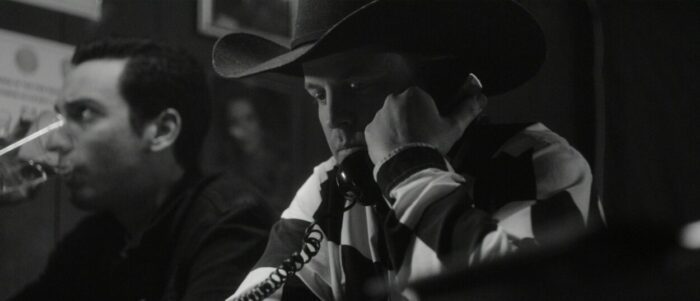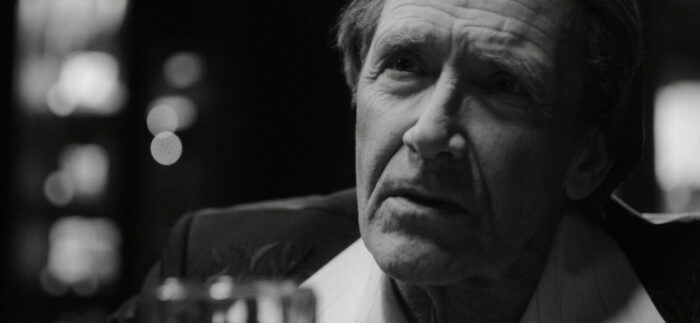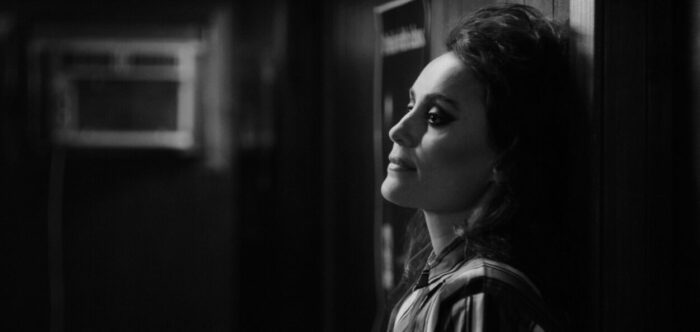One of the most pervasive things one notices while watching Country Gold, Mickey Reece’s latest, is that the film is not very musical. The film, for all the theatrics around rising ‘90s country star Troyal Brooks, as well as his washed-up idol George Jones, the two leads played by Reece and Ben Hall respectively, clearly has little reverence for actual country music and its history. Country Gold is more concerned with telling a story of a fateful night for these two men, one in which they meet, get to know each other, and explore their own lives, regrets, and their strange dreams and fantasies. It makes for a bizarre and captivating film about mortality, legacy, and American culture—and maybe a little bit about country music.

The film begins with Reece’s Troyal Brooks living his life as a country music star at the height of his popularity in the year 1994. One day, he receives a letter from George Jones, his longtime idol and inspiration, who asks him to come to Nashville for a night of dinner and drinks, wanting to meet Troyal before he takes a “long vacation.” Troyal agrees, and the ensuing night makes up the bulk of the film, as Jones reveals his real intentions to Troyal and the men slowly reveal their true selves to each other.

That premise alone sounds like a good setup for some surreal comedy, but it is difficult to overstate just how many surprises the film has up its sleeve. Country Gold is packed with non sequiturs, strange side notes, and odd vignettes that deserve to remain as surprises, many of which make little sense in the context of the whole film on first viewing. There are frequent switches on a dime from light comedic moments to unnerving tension or dramatic, weighty confessions. It’s a jarring experience, but one that trains the viewer not to know what to expect, but to welcome whatever comes next in its tight 84 minutes. It seems rare that a film like this can be genuinely surprising, but even at its most derivative of figures like Lynch or the Coens, it feels like Country Gold is layered and deliberate and has something cohesive in mind with its absurdity.
Reece gives a phenomenal performance often masquerading as a bad one. Over the film, Troyal’s faux confidence gives way to more honesty and pathos. Hall’s George Jones unravels in a somewhat similar way, being introduced as a cool and collected if washed-up country star, before eventually showing his real, manic self. It is a joy to watch the two riff: their chemistry is palpable and many of their scenes feel nearly improvised in how naturally they play off each other.
Reece shares a number of similar scenes with the rest of the supporting cast, including Troyal’s agent Terry (Jacob Ryan Snovel). Most supporting characters shine through despite very limited screen time: Joe Cappa stands out as Juno, seemingly doing his best Sam Elliott impression, as does Whit Kunschik as Connie, one of a trio of women the men meet out on the town. There are many more who flourish in short bit parts as characters drop in and out of George and Troyal’s story.

Country Gold really is, importantly, a comedy at its heart. There is a lot of wit and dark humor to the film’s writing, and a lot of dialogue has an improvisational feel to it. Each character reveals more of themselves in their comedy—Troyal loves country music and has an enormous ego, while George is old, jaded, and sleazy—and the film feels less like a vehicle for jokes as much as it is simply inhabiting a silly world filled with silly people.
It may be a cliché to describe a film as surreal or dreamlike, but Country Gold employs the surrealist aesthetic deliberately and consistently across all its elements. The film, shot in black and white and almost entirely indoors, has lots of hard light, but in its visual sense feels held back. Reece and his crew clearly had limited resources, and it really shows in the film’s sets and general sense of setting. There are moments where bare-looking sets and production design risk looking visibly cheap. Furthermore, the film, being shot almost entirely indoors, never expresses a tangible sense of place, somewhat disappointing for a story set in Nashville and at least with the pretension of focusing on country music. Most of the time—particularly in one scene in a very dim lit bar—the film salvages its limited production design with its incredibly rich cinematography. The excellent black-and-white work helps it feel more vibrant even in moments where the actual environment is visually drab and uninteresting.
Reece is an exciting filmmaker with an interesting voice. Country Gold feels surprising and bold in a way, and gives Reece an opportunity to stretch his chops as a writer, director, and star. Ben Hall steals the show, though, with his frantic, domineering energy as a burned out has-been desperate to take control of his own life. The two leads and a surprisingly deep supporting cast help make Country Gold a fascinating and often hilarious watch.
Country Gold, written and directed by Mickey Reece, streams exclusively on Fandor beginning April 4, 2023.



